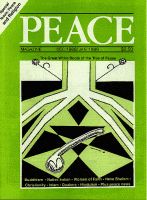
Peace Magazine Dec 1988-Jan 1989, page 4. Some rights reserved.
Search for other articles by Metta Spencer here
WHEN IT COMES TO peace, religion has a mixed record, seemingly prompting as many disputes as it has resolved. Many wars and intergroup struggles are between different religious groups: Catholics versus Protestants in Northern Ireland, for example, and Jews versus Muslims in the Middle East. But most such fights are not really about religion, but are ethnic rivalries over privilege and pride, property and politics.
Religion has dual effects upon the faithful: It can comfort them by reassuring them and relieving them of guilt feelings, and it can challenge them to work for a better social order. The comforting tends to buttress the status quo, whereas the challenging tends to stir up zeal for reform, which may or may not benefit society, but provokes conflict in either case.
Religious communities do not all have equal cultural resources for handling such conflicts in compassionate, non-harmful ways. Thus Mubarak Awad was unable to find a single book in Arabic or Hebrew about nonviolence. Nevertheless, he found historical cases when particular Muslims and Jews had struggled nonviolently for justice.
Today, most major faith communities have taken a stand for nuclear disarmament and against economic exploitation and other evils, such as apartheid. They are actively challenging the faithful. Can they do so in a way that also comforts? The reforms need to be pursued in a spirit that affirms and inspires, even in the heat of struggle. This special issue of PEACE is dedicated to that aim.
During this season of celebration, we embrace the peacemakers of all faiths. You will read here articles about the peacemaking of Buddhists, Christians, Hindus, Jews, Muslims, and Native Canadian Indians; only the limitations of space prevented greater inclusiveness. Peace be with you all!
BESIDES THE FOCUS ON RELIGION and peace, we continue the ongoing work of the magazine, covering activities of peace groups in Canada, completing John Bacher's series on the Secret Team, and covering work on nuclear disarmament. Let me call particular attention to the article by our U.N. correspondent, Maxime Faille, who reminds us of the central importance of attaining a Comprehensive Test Ban Treaty (CTB). It the single most urgently needed step toward nuclear disarmament. Without it, many different countries will acquire nuclear weapons and no control of this problem will be possible. Yet, regrettably, Canada has weakened its support of a CTB, under pressure from the United States. There are now new opportunities to work for a CTB, and we urge you to make that your top priority in 1989.
We have to combine peace work with other pressing duties, such as the preservation of our global environment. But this is a season for making new resolutions. Let us all promise ourselves to do one act for peace every day. (Write a letter. Start a conversation with the barber. Put a copy of PEACE in a waiting room. Boycott war toys. ...)
"I can't do everything, but I can do something!"

Peace Magazine Dec 1988-Jan 1989, page 4. Some rights reserved.
Search for other articles by Metta Spencer here